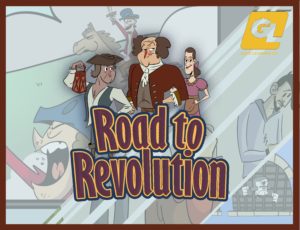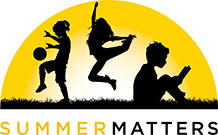On occasion, Summer Matters contributors or Partnership for Children and Youth staff will have the opportunity to preview new educational resources. We tend to focus on curriculum and practical guidance for K-12 educators, especially those that might be a good fit for Expanded Learning programs. Product reviews are not paid or sponsored unless otherwise indicated, and seek to be fair and balanced. Our hope is to help the expanded learning field (after school and summer programs) make informed decisions when considering resources. The views expressed in any product review are those of the contributor, and may not reflect the views of the organization or our partners.
Game Learning: a fully immersive learning experience bringing to life historical moments through video games

In Boston: Road to Revolution, players navigate through some of the most defining struggles in United States history from the perspective of poets, spies, patriots, and slaves. From the Boston Massacre to John Adams’ fight for fair trials, Colonial Boston had no shortage of obstacles to overcome. Will you rise to the occasion?
Game Learning is an educational video game development company that believes fun and education should go hand in hand. They’ve released two games: Roanoke: The Lost Colony and Boston: Road to Revolution, and they have 60 more games under development.
The core premise of Game Learning is that the use of educational video games benefits students by:
- encouraging critical thinking by asking students to make historical decisions,
- supporting engagement by making the historical context more interactive and immersive, and
- cultivating empathy by highlighting the perceptions of historical figures.
Educators have been using video games to teach STEM skills for some time. For example Minecraft is a popular game many schools encourage and even build after school or summer clubs around. Game Learning has been using video games to teach history in a new way. On their website, gamelearning.co, they explain it this way:
Game Learning transports kids back into the past so they can experience key historical moments firsthand. Game Learning history lessons focus on fascinating moments throughout history and lets kids imagine what they would have done had they been in the shoes of the pivotal figures who lived them. Allowing children to think about history not just as a boring collection of dates and facts but as a collection of living stories that still impact us today allows the subject to be learned in a way that’s much more immediate, fun, and life-changing for young students. Game Learning lessons put kids into historical situations and forces them to ask themselves: What would I have done in this situation? Why did these historical figures make the choices they made? And how did these decisions help shape our present world?
This approach provides a unique opportunity to support learning, but it is important to note that these games are not well positioned to replace more traditional instruction. Students should be encouraged to interact with the concepts, debate positions, perform their own research, and draw their own conclusions. Video games, and more specifically, the products Game Learning has developed, are a helpful supplement to an active learning environment. Teaching a unit on the leading up to the American Revolution? Consider supplementing that lesson with the game Boston: Road to Revolution.
First Impressions
I tried the demo versions of each the games and here are some first impressions:
The game play is self-guided and addictive.
Expanded learning programs might consider encouraging youth to play the games at strategic moments throughout the day. For example, a program that supports student choice by allowing students to select from a number of academic activities could make Game Learning games one of the options alongside activities like reading, crafts, and interactive games. I often see such moments of choice occur after homework completion (since each young person completes their homework at a different rate) or at the end of the day (since each young person might leave at a slightly different time). While the game play is not fast-paced, I did find myself playing for longer than I had intended because I kept finding myself wanting to see what would happen next.
The characters the player acts as during the demos are historically underrepresented.
In Roanoke: The Lost Colony, the player acts as an indigenous person tasked with things like hunting, gathering, and cultivating the land until a “wooden whale” shows up on the coast. The arrival of Europeans is sure to change the lives of indigenous people. In Boston: Road to Revolution, the player embodies the role of a woman. It wouldn’t be unreasonable to suggest that the stories of women in the American Revolution are underrepresented. I’m excited and optimistic to see how the game play might encourage empathy and interest in underrepresented historical views.
There is an opportunity to dive deeper into the highlighting of historical moments.
The games are a bit unclear at times about the relevance of the historical moments they highlight. This means they should be limited to use as a supplement to more intentionally designed, active learning experiences. I’d like to see a deeper dive, such as some optional reading or instructional videos that players are incentivized to consume before moving on in the game.
There could be more choices for the player to make early on in the demos.
There are a number of moments when the player interacts with other characters that after a bit of dialogue (which is displayed on the screen), and is then prompted to choose a response, but during the demo, there is usually only one response. This is probably just an effect of it being an early moment in the game before much has been developed in the way of plot. The unfortunate effect though is that the player might be get bored, and as an educator, I wasn’t able to quickly see the kinds of choices players would be asked to make. I’d recommend the developers create a demo of a later stage in a game to better demonstrate this feature. At points there will be limited choices or the illusion of choice for the purpose of advancing the plot, but I’d like to see what some of the more complex choices might involve to better support students’ critical thinking.
The user licenses are very affordable.
Game Learning licenses are $0.99 per month or $9.99 per year. This might be the most affordable e-learning platform I’ve seen yet. This makes it worth the risk, and the web-based (or mobile app) delivery of the game makes the technological barrier to entry very low. If your school has computers or iPads with internet access or your program youth have access to phones (after the release of the mobile version), you’ll have everything you need to get started. This takes the risk out of the purchase.
Bottom Line: Try it and see what your students think!
I’d encourage expanded learning program providers to give Game Learning a shot. The cost of trying the service for a year is low, the two games that have been published are interesting and show a lot of potential, and the company is positioned to release more games in the future. As with any online educational tool, I’d encourage educators to leverage technology to build a more rich, interactive, and customized learning experience for their students, while having realistic expectations and prioritizing active, inclusive, and hands-on learning for every student, every day.
Brief Information About Game Learning
- Game Learning is a fully immersive learning experience bringing to life historical moments through video games
- Includes access to a suite of educational video games
- Each chapter expands upon turning points in history from diverse perspectives of various historical figures.
- Game Learning licenses are $.99 per Month or $9.99 per year
- Game Learning is in the process of developing 60 unique games, surrounding the most pivotal moments in history
- For children aged 9-14
- Available on desktop/laptop web browser or ipad IOS (Mobile coming soon)
- At the time of this posting, the National Afterschool Association is hosting a giveaway. One lucky program winner will get free Game Learning Licenses for a YEAR! *Competition runs from May-July, 2018*
- Convenient and easy to use
- Children can use the games at home and in the classroom
- Encourages kids to learn through having fun and interacting with historical content
- How it Works: Go to www.gamelearning.co, create an account, choose your adventure, and Have fun!
Daren Howard is the Director of Technical Assistance and the Partnership for Children and Youth. He is responsible for the organization’s consulting initiative, which provides direct support to school districts, public agencies, and community based organizations through advocacy, training, coaching, and consulting. Daren has been a youth development professional since 2004. He has served students of all ages across California and in Mexico. Prior to joining Partnership for Children and Youth, Daren worked with THINK Together in Southern California to provide high quality, academically oriented Afterschool, and Summer Programs. He also served as a Technical Assistance Peer Reviewer for the Los Angeles County Office of Education, and as a community advisory board member for several local and statewide committees.
*An earlier version of this post criticized the visual graphics as limited, and therefore best for mobile, when in fact, the graphics are limited by capacity of the graphics cards available in Chromebooks, which are widely used in schools. It’s the reviewers opinion that stronger visual design might better engage students to try the game, but this must be balanced with the technology gap in public schools and low-resource communities.


